SANAA: Tens of thousands of supporters of Yemen’s Shia rebels rallied on Friday in Sanaa pressing the government to quit as a presidential team held crisis talks in their stronghold to end the impasse.
After the rally, a group of Zaidi rebels began erecting an encampment on a road in northern Sanaa that leads to the airport and where the interior, communication and electricity ministries are located.
The protest was staged the final day of an ultimatum set by rebel commanded Abdulmalik al-Huthi for the government, which they accuse of corruption, to resign.
But on the streets protesters chanted: “The people want to overthrow the government” and demanded that the cabinet revoke a decision to double fuel prices.
They also repeated the Iranian revolutionary slogan: “Death to America. Death to Israel. Allahu Akbar.”
Authorities in Sanaa have long accused Shia-dominated Iran of backing the Zaidi rebellion.
Friday’s protest marks the start of the “second phase of the peaceful revolutionary escalation” through “legitimate means”, Huthi said.
Thousands of armed rebels, also known as Ansarullah or Huthis, have strengthened their positions around Sanaa as they press their campaign against the government.
The movement has raised fears of a new wave of violence in impoverished Yemen, which is in political transition at a time of an Al Qaeda insurgency and a southern separatist campaign.
“The situation in Sanaa is indeed combustible and ripe for miscalculation,” said April Longley Alley, a Yemen specialist with the International Crisis Group.
“At this point the Huthis are capitalising on widespread frustration with the government and the recent rise in fuel prices to rally support and extract political concessions,” she said.
Bracing for an escalation, President Abdrabuh Mansur Hadi on Thursday urged the armed forces to “raise their level of vigilance”.
But apart from the usual guards for the ministries, there was no sign on Friday of a police or military presence near the makeshift protest sites, around which armed Huthi militants set up checkpoints.
The rebel commander has vowed: “We will not remain with our arms folded ... if the armed forces attacked protesters.
Meanwhile, a presidential delegation was holding talks with the Huthi commander in his Saada stronghold to convince his group to join a national unity government.
Huthi said late on Thursday that the delegation had “shown understanding for some of our demands” but negotiations and protests would continue.
Speaking to the defence ministry’s news website 26sep.net, presidential team spokesman Abdulmalek al-Mikhlafi said the results of talks with Huthi had been “positive and reassuring.” Talks were continuing on Friday to “reach an agreement in the interests of the Yemeni people,” he said.
For Alley, “the best-case scenario at this point is for the president to broker a political compromise that includes significant changes to the widely unpopular unity government in return for the Huthis joining and supporting the government.”
Meanwhile the UN evoy to Yemen, Jamal Benomar, said in a statement on his Facebook page he was holding “intensive consultations with various parties and Yemeni political leaderships to find a peaceful” solution to the country’s political impasse. And the six-nation Sunni-ruled Gulf Cooperation Council condemned the “unfortunate” events taking place in Yemen, in a statement by its secretary general, Abdullatif al-Zayani.
The Zaidi rebels oppose the government’s plans for a six-region federation, demanding a single region for the northern highlands and a greater share of power in the federal government. They control Saada province in the far north and parts of several neighbouring provinces.
Rebels reached the outskirts of Sanaa in July after seizing Amran to its north, although they later agreed to withdraw.
Ansarullah has been fighting an on-off conflict with government troops in the northern mountains for the past decade. The Zaidi Shias, a minority in mainly Sunni Yemen, form the majority in the northern highlands, including the Sanaa region.
Published in Dawn, August 23rd, 2014
















































